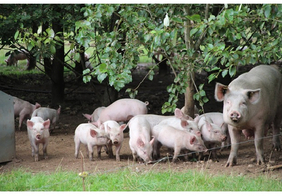Mixed land use systems can be hard to grasp, as they involve the most diverse aspects of land use from farm to landscape level. After 18 months of project work, it was therefore fitting and important to meet the partners of the MIXED project.
From 26-29 April 2022, the second project meeting took place in Billund, Denmark - for the first time in physical form. Despite Legoland in sight, the focus was on project work nonetheless. Networks presented their particular aspects of land use, such as the Montado in Portugal, grazing of winter cereals by sheep in Scotland, collaborations at landscape level in France and the Netherlands, and much more. The steps taken so far were explained and placed within the overall context of the project.
However, the central topic was still the alignment of the work in the peak phase of the project, which is about to begin. In particular, the extensive data collection on partner farms, which will subsequently be incorporated into various modelling exercises in order to gain new insights into live cycle assessments, value chains and also the efficiency and resilience of mixed land use systems.
The Danish hosts went the extra mile and the content-related discussions were combined with various excursions. The visit to the "Greenlabs" industrial park in Skive, which pursues the vision of symbiotically connecting different industries, was impressive. Be it through the use of waste heat or residual materials from the biogas plant, pyrolysis and biochar production or even the extraction of proteins from starfish. A special highlight, however, was certainly the visit to an organic pig farm with year-round free-range husbandry. Insulated shelters laid out with straw are available for farrowing, groups of piglets dash back and forth between strips of agroforestry and sows rest in the shade. Only after 10 weeks the piglets are weaned off, but even then they have plenty of straw, fresh feed such as carrots or beets and a wellness area to wallow and burrow, before being marketed as "poplar pigs".
The mixed land use systems seen as well as industrial approaches in Denmark are certainly part of the solutions needed to adequately address existing and future challenges. It is here that the MIXED project is trying to play its part – follow the project on Twitter, Facebook or LinkedIn.
Contact at IfLS: Holger Pabst (pabst[at]ifls.de)
